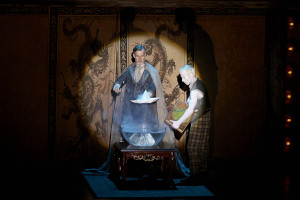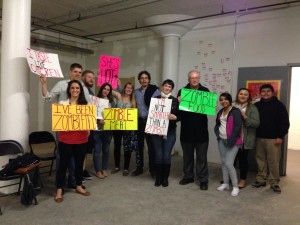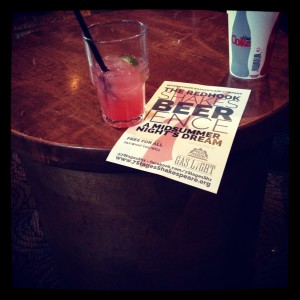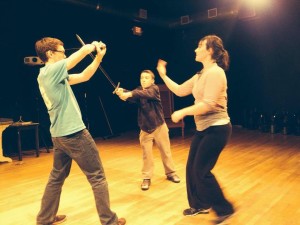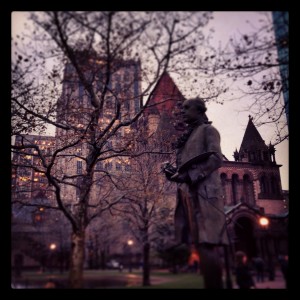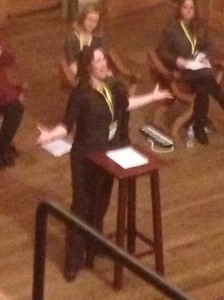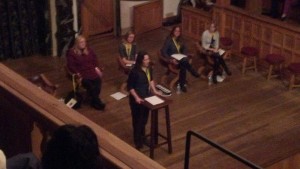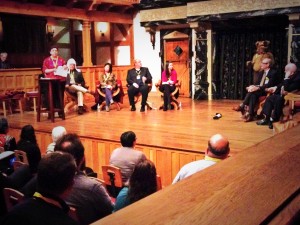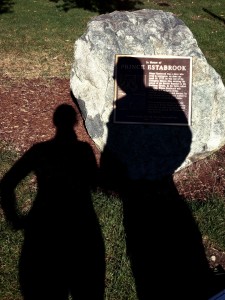Since I’m in dissertation land, time flows in strange bobs. For example: we returned from New York City over a week ago and I still haven’t managed to blog about one of the best parts of the trip: a performance of Macbeth by the Drunk Shakespeare Society!
When my mom proposed the outing, I was a bit dubious. The evening bills itself as a small ensemble of actors getting drunk and doing Shakespeare. “Well”, thought I, “This will either be completely insane and amusing, or a train-wreck of a disaster such that I simply won’t be able to look away and I’ll have no recourse but to blog about it passive aggressively in hopes that one of the actors googles himself and my blog entry pops up in the search results.” Lucky for all of us, it was an experience of the first degree.
The Drunk Shakespeare Society performs six shows a week in one of those NYC spaces that, through careful diligence, transforms from a hole in the wall to a magic fairy land of entertainment. They’ve annexed a room in the Lounge at 400 West 43rd (right next to a seedy Comedy Club) and transformed it into what feels like a society subscription library. Books are arrayed in every corner, splayed on oak bookshelves, and arranged by color. You’re basically sitting inside a Victorian library that had a bit too much Pride to be stifled by the social restrictions of alphabetization.
The premise is that one of the actors gets completely ferschnockered before your eyes, and the ensemble then performs a 90-minute cut of one of Shakespeare’s more famous pieces. The drunken actor generally takes the lead (so for us it was the gentleman playing Macbeth who took the dive) and is supported by the rest of the talented cast. To enhance the experience, you can pay extra to participate as the King and Queen for the evening, which entitles you and one guest to a crown, throne, a bell to ring and effect the play’s action, champagne, caviar, and home-hade chocolates. We didn’t spring for the throne,
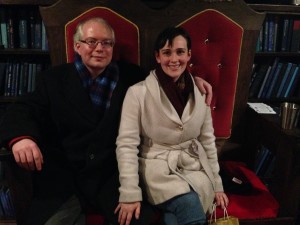
And, of course, you can totally just steal the throne for pictures after the show.
but it was fun to watch others as they made the play for it. Apparently you can pre-purchase it; though the evening we were there it was up for auction before the performance.
In terms of talent, the company is not to be missed. Forget the gimmick, improv, and the smart additions to the script; these are some pretty well trained classical thespians with acting chops to match their colossal livers. And trust me, I don’t say that about everybody I see bark out a sonnet onstage.
What was most exciting was to see how these actors engaged with the text in a way that got their audience similarly engaged. And the folks in the audience weren’t necessarily folks I would expect to see at your run-of-the-mill production of Macbeth. At one point, as I was watching an actor and an audience member race to shotgun a beer while the fate of the play rested in the outcome of the race (…I learned all kinds of things that night… including that “shotgunning a beer” is a thing that not only exists, but can be included in sportsmanship competitions), I realized that this was perhaps one of the most noble arts endeavors I had seen in recent time. Here was, writing a dissertation on how Americans made Shakespeare their own in the post-Revolution years, and I was witnessing first-hand the modern incarnation of the age-old phenomenon.
Because, you see, Edwin Booth didn’t perform Hamlet “AS SHAKESPEARE WROTE IT”. Edwin Booth performed Hamlet as Edwin Booth wanted to perform Hamlet. Nineteenth century American actors basically re-wrote the text to conform to cultural norms of the time. Heck, King Lear as written by Shakespeare was removed from the repertory for hundreds of years because it was simply too sad (…they instead performed a version written by Englishman Nahum Tate somewhere around 1681 which wasn’t eradicated from the stage until circa 1838). So what were these slightly intoxicated actors doing if not following the noble line of history in updating a cultural phenomenon to make it more appealing to a mass audience?
And you know what, anything that anyone can do to make Shakespeare appealing to a mass audience while remaining hat-tippingly respectful of the text is fine by me. As much as I tout myself as a “purist”, I’m a purist who enjoys a good laugh like anyone else. So long as you’re not billing yourself as “AUTHENTIC SHAKESPEARE” but rather some kind of adaptation or alteration, so long as you’re enjoying and having fun and making art to help others do so as well, so long as you’re not causing trauma to unsuspecting middle schoolers and forcing them to swear off the bard for the rest of their earthly existences, do that voodoo you do. The world will be a better place for it.
Anyway, if you get half a chance, you really need to check out Drunk Shakespeare. It’s a hoot, holler, and everything between. I think it would be particularly useful/inciting for those who don’t feel that they enjoy Shakespeare, or perhaps that they haven’t yet found some kind of understanding of it. DS is definitely a good gateway drunk to the world of all things Bardy. Especially if you enjoy one of their (admittedly overpriced) cocktails with the show; that will definitely get the brain wheels greased and ready for action.

